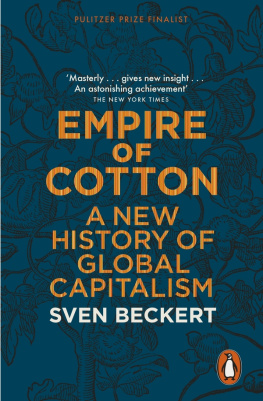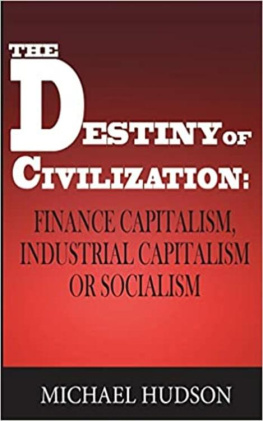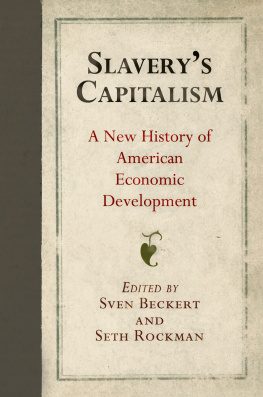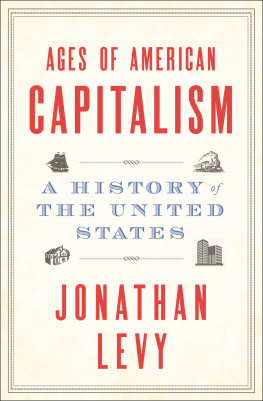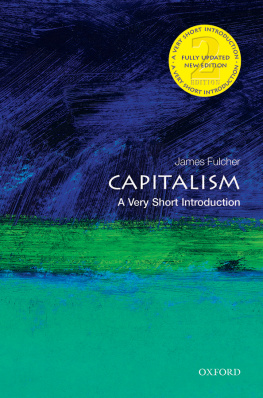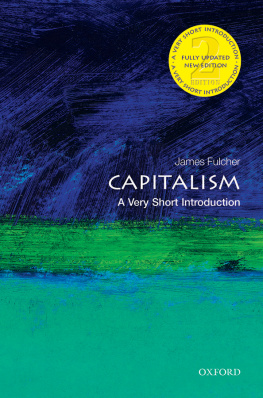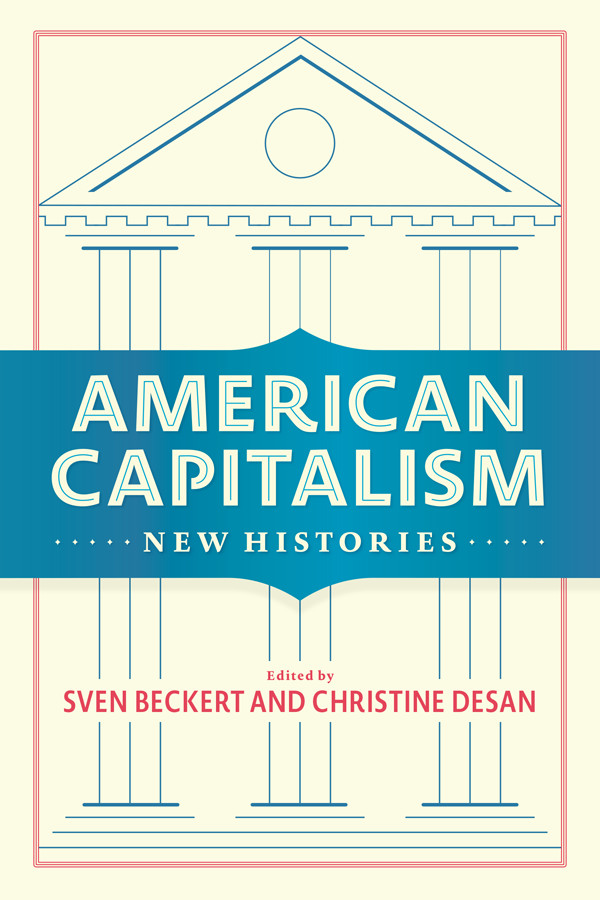Contents
Guide
Pagebreaks of the print version
AMERICAN
CAPITALISM
COLUMBIA STUDIES IN THE HISTORY OF U.S. CAPITALISM
COLUMBIA STUDIES IN THE HISTORY OF U.S. CAPITALISM
Series Editors: Devin Fergus, Louis Hyman, Bethany Moreton, and Julia Ott
Capitalism has served as an engine of growth, a source of inequality, and a catalyst for conflict in American history. While remaking our material world, capitalisms myriad forms have alteredand been shaped byour most fundamental experiences of race, gender, sexuality, nation, and citizenship. This series takes the full measure of the complexity and significance of capitalism, placing it squarely back at the center of the American experience. By drawing insight and inspiration from a range of disciplines and alloying novel methods of social and cultural analysis with the traditions of labor and business history, our authors take history from the bottom up all the way to the top.
Capital of Capital: Money, Banking, and Power in New York City , by Steven H. Jaffe and Jessica Lautin
From Head Shops to Whole Foods: The Rise and Fall of Activist Entrepreneurs , by Joshua Clark Davis
Creditworthy: A History of Credit Surveillance and Financial Identity in America , by Josh Lauer
AMERICAN
CAPITALISM
New Histories

EDITED BY
SVEN BECKERT AND
CHRISTINE DESAN
Columbia University Press
New York

Columbia University Press
Publishers Since 1893
New York Chichester, West Sussex
cup.columbia.edu
Copyright 2018 Columbia University Press
All rights reserved
E-ISBN 978-0-231-54606-5
Library of Congress Cataloging-in-Publication Data
Names: Beckert, Sven, editor. | Desan, Christine, editor.
Title: American capitalism : new histories / edited by Sven Beckert and Christine Desan.
Description: New York : Columbia University Press, [2018] | Series: Columbia studies in the history of U.S. capitalism | Includes index.
Identifiers: LCCN 2017028907 (print) | LCCN 2017054108 (ebook) | ISBN 9780231185240 (hardcover : alk. paper)
Subjects: LCSH: CapitalismUnited StatesHistory. | United States Economic conditions. | United StatesEconomic policy. | United StatesCommerceHistory.
Classification: LCC HB501 (ebook) | LCC HB501 .A5698 2018 (print) | DDC 330.973dc23
LC record available at https://lccn.loc.gov/2017028907
A Columbia University Press E-book.
CUP would be pleased to hear about your reading experience with this e-book at .
Cover design: Nancy Rouemy
To Morton Horwitz, who brought law and history together to illuminate capitalism 
CONTENTS
WOODY HOLTON
JULIA OTT
KIM PHILLIPS-FEIN
RICHARD WHITE
AMY DRU STANLEY
SETH ROCKMAN
CHRISTOPHER TOMLINS
MARY POOVEY
PETER KNIGHT
MICHAEL RALPH
ELIGA H. GOULD
PETER A. COCLANIS
MICHAEL ZAKIM
KRIS MANJAPRA
T his book has been made possible by many people and institutions. First, and most important, we want to thank the students, scholars, and other participants who have animated the Workshop on the Political Economy of Modern Capitalism for many years. Their creativity, energy, and insight drove the discussions that made this book possible. A special thanks to Alexander Keyssar, who helped create the Workshop, and to Arthur Patton-Hock, who has provided the managerial prowess that keeps the Workshop going. We are grateful to Larissa Kennedy, Monnikue McCall, and the directors of the Charles Warren Center, Liz Cohen, Joyce Chaplin, Nancy Cott, Walter Johnson, and Vince Brown for their support. We have also benefited from the support of the Harvard Law School, the Harvard University Graduate School of Arts and Sciences, and the David Howe Fund for Business and Economic History for the resources that have enabled us to run the Workshop for so many years. A big thank-you also to the Harvard History Department, including Mary McConnell, for long-running support of the Workshop in general, and of this book in particular.
Many people contributed to the production of this volume, including Shaun Nichols, Rachel Steely, and Martha Shulman. Peter Knight at the University of Manchester, Christopher McKenna at the University of Oxford, and Julia Ott at the New School convened a series of conferences that stimulated the book. We also greatly appreciate the energy and dedication that the speakers and commentators at the 2011 Conference on the New History of American Capitalism brought to Harvard University. Thanks particularly to Seth Rockman, Amy Dru Stanley, and Suzanne Desan for essential help during formative stages. We are especially grateful to Ashley Fournier Davis and Susan Jane Smith for their adept coordination and support of the entire process.
Bridget Flannery-McCoy was an amazing editor throughout. We appreciate the invaluable support of Christian Winting and Marielle Poss at Columbia University Press; the series editors, Devin Fergus, Louis Hyman, Bethany Moreton, and Julia Ott; and Erin Davis and the team at Westchester Publishing Services for their great work.
Finally, we thank friends and family who coached and cajoled. We imagine that each contributing author would agree. We take the occasion here to thank particularly Robert Husson and Lisa McGirr.
O ver the last decade, attention to capitalism as a political economic form has skyrocketed. Newspapers of all political stripes debate the future of capitalism. Pope Francis has made capitalism a central theme of his papacy. A French economist, Thomas Piketty, has attained rock star status for publishing a book on the manifold inequalities he attributes to capital. And a cottage industry producing books predicting the end of capitalism
Since the early 2000s, however, debates on capitalism have returned with a vengeance. And historians, ever attentive to the world they live in, have taken note. Driven by student interest, the focus on the history of capitalism emerged first as a teaching field at American universities. Soon the history of capitalism became a framework that organized a burgeoning wave of research perhaps best demonstrated by a surge of conferences on the topic.
The attention to capitalism among historians flows from a convergence of events. Most obviously, since the fall of the Berlin Wall, capitalism has come to predominate throughout much of the worldthe end of the Cold War and the collapse of the Soviet Union having undermined competing modes of organizing economic activity. Capitalism of a wide variety of institutional and ideological stripes now characterizes all developed economies. Many in the postcolonial world join in recognizing capitalisms impact, whether they identify it as a model for engendering economic growth or target it as an impediment to sustainable development. The international institutions that most powerfully coordinate financial, trade, and economic relations today overwhelmingly assume capitalist economies as their paradigm. So much has the political economy of capitalism and Western liberalism come to dominate that in 1992 an American political theorist, Francis Fukuyama, argued that we had reached the end of history. To him, it seemed that the contemporary political economy would structure economic, social, and political relations into the foreseeable future.


